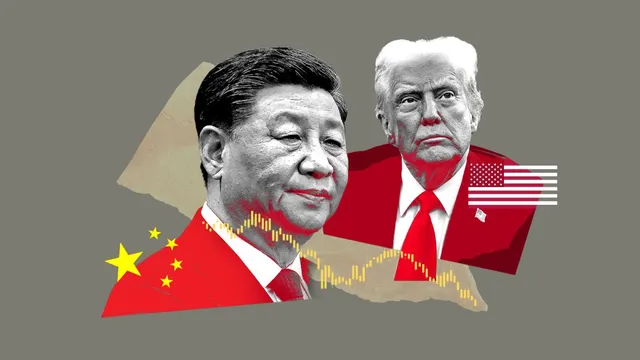
China holds back from addressing Trump over tariffs out of fear
2025-04-11 03:43- Cambodia's garment industry faces a potential 49% tariff increase on exports to the U.S., threatening its economic stability.
- Xi Jinping's fear of criticism from Communist Party members prevents him from engaging in discussions with Trump regarding tariffs, despite the economic rationale.
- China's internal political dynamics hinder negotiations, leaving the ongoing trade conflict unresolved and potentially impacting other countries reliant on U.S. markets.
Express your sentiment!
Insights
On April 3, 2025, Cambodia was hit with the news that their garment exports to the United States would face a significant tariff increase of 49%. This tariff change is expected to have a devastating effect on Cambodia's garment industry, which is crucial to the country's economy as it accounts for more than half of its export revenues. Experts have warned that the enforcement of this tariff could lead to severe economic challenges for the nation, as a large portion of their garment products are sold in the U.S. market. Though President Donald Trump delayed the enforcement of these tariffs as of April 9, the possibility remains that they could be reinstated in the future, which threatens to further destabilize the Cambodian economy. As these developments unfold in the international market, China stands in a complicated position due to ongoing trade tensions with the U.S. Chinese President Xi Jinping finds himself in a precarious situation where reaching out to Trump to negotiate regarding tariffs could lead to backlash from fellow Communist Party members in China. Gordon Chang, a noted expert on China, has suggested that Xi's hesitation stems from a fear of criticism within the Party, as he has shaped a political climate where only the most aggressive strategies are deemed acceptable. Therefore, he is unable to make calls or take actions that could be seen as conciliatory to Trump, even if such moves would be in China's economic interest. This situation puts China in a vulnerable position where it aims to exert influence amidst perceived chaos in America, but is hampered by internal political dynamics. Xi's reluctance to negotiate creates a scenario where the trade war continues without resolution, impacting not only China and the U.S. but also countries like Cambodia and Vietnam that rely heavily on their exports to the U.S.
Contexts
China's trade policies with the U.S. play a crucial role in shaping the global economic landscape. These policies have evolved significantly over the years, influenced by both domestic economic goals and the complex relationship between the two nations. In the past, China's approach to trade has often been characterized by a blend of export-led growth strategies, state intervention, and an emphasis on attracting foreign direct investment. The ongoing trade tensions, particularly since 2018, have led to a series of tariffs imposed by both countries, impacting various industries and altering the dynamics of bilateral trade. This context has also prompted China to seek alternative markets and diversify its trade relationships outside of the U.S. to mitigate dependency and vulnerabilities in its economy. Moreover, China has been accused of unfair trade practices, such as currency manipulation, intellectual property theft, and subsidizing domestic industries at the expense of foreign competitors. The U.S. has responded by implementing tariffs and negotiating trade agreements aimed at curbing these practices, while also advocating for a more equitable trading environment. The complexity of these trade policies is further exacerbated by geopolitical considerations, as both nations grapple with issues like national security and technological supremacy. Recent developments indicate that both sides remain entrenched in their positions, with intermittent negotiations yielding limited progress. In response to international pressures and domestic needs, China has been pursuing initiatives such as the Belt and Road Initiative (BRI) to expand its trade networks and improve economic ties with partner countries. This initiative not only strengthens China's position as a global economic leader but also serves to counterbalance the influence of U.S. trade policies. Furthermore, China's efforts to boost domestic consumption and innovation are part of a broader strategy to reduce reliance on foreign markets and enhance the resilience of its economy, amidst ongoing trade friction with the U.S. As a result, China's trade landscape is experiencing significant transformations as it aims to adapt to evolving global economic conditions. As of April 2025, the trade relationship between China and the U.S. remains dynamic, with the potential for both cooperation and conflict. While there are opportunities for dialogue and collaboration in areas such as climate change and public health, fundamental disagreements over trade practices and regulatory standards persist. The future of China's trade policies with the U.S. will likely be shaped by these ongoing negotiations, alongside the broader geopolitical shifts that influence global trade patterns. The ability of both nations to navigate these complexities will have far-reaching implications for international trade, economic stability, and the overall trajectory of global relationships in the years to come.